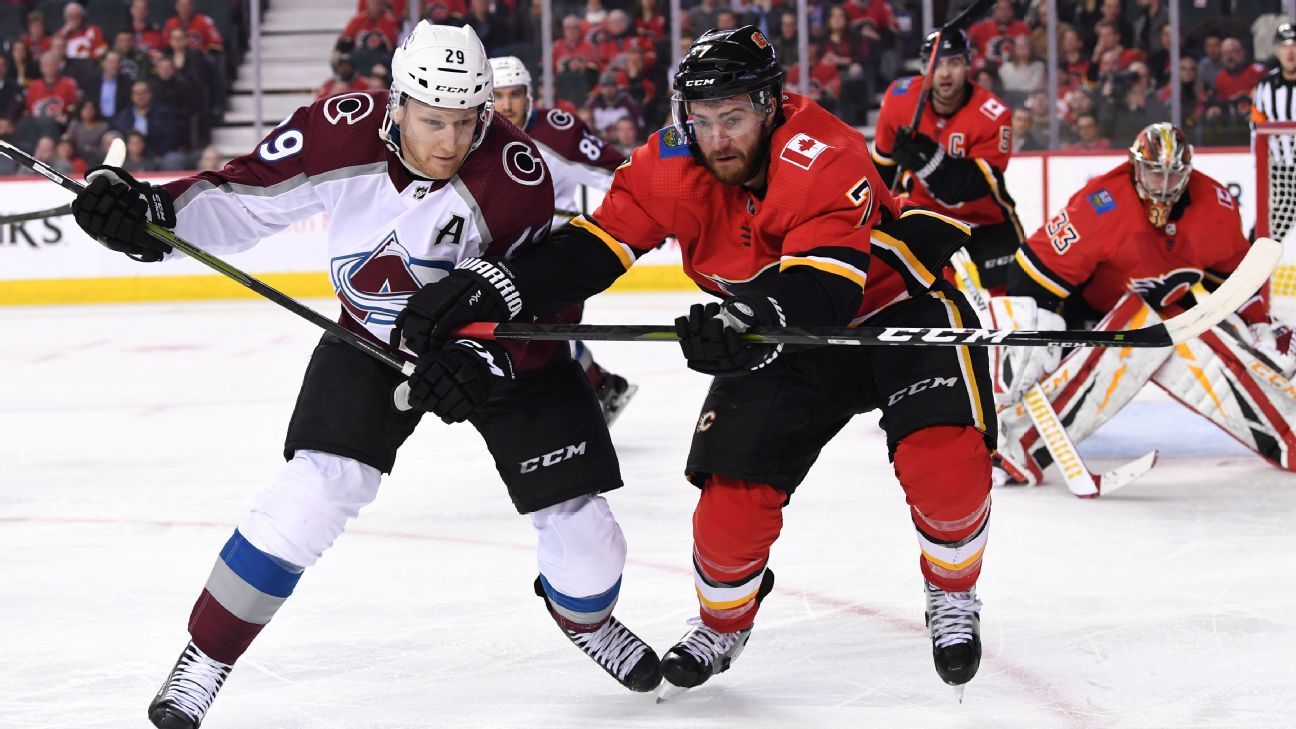The Calgary Flames roared to the top of the Western Conference this season, while the Colorado Avalanche narrowly qualified for the 2019 Stanley Cup playoffs. Who wins the series? Let’s break it down:
How they got here: The Flames missed the playoffs last season after making them in 2016-17 for one primary reason: offense. They had a 2.63 goals per game average, ranking them 27th in the league. So GM Brad Treliving got to work. He fired head coach Glen Gulutzan and replaced him with former Carolina coach Bill Peters. He made a blockbuster trade, moving defenseman Dougie Hamilton to the Hurricanes with Micheal Ferland and the rights to Adam Fox for defenseman Noah Hanifin and forward Elias Lindholm. He signed Derek Ryan and James Neal (although the less said about that latter signing, the better).
These changes, along with career years from Johnny Gaudreau (99 points) and Matthew Tkachuk (34 goals), helped the Flames to be the league’s third-best offense, at 3.52 goals per game. Their Mark Giordano-led defense was good enough in front of their below-average goaltending to win them the Pacific.
The Avalanche had a more complicated path to the postseason, clinching their wild-card spot in the last days of the regular season. They did so on the back of goalie Philipp Grubauer, acquired last summer from the Capitals, who went 8-1-2 down the stretch and gave up more than two goals just once in that span. While depth is not a word associated with these Avs, they do boast one of the best lines in hockey when the group is together and healthy. Can they muster up enough pop to keep pace with Calgary?
First line: Nathan MacKinnon, Mikko Rantanen and Gabriel Landeskog played 841 minutes together at even strength and dominated: 46 goals, a goals-for percentage of 61.33 and a 54.56 scoring chance percentage. But Calgary’s Sean Monahan, Gaudreau and Lindholm were nearly as potent offensively in 823 minutes, with 52 goals, a 59.77 goals-for percentage and 52.56 percent of scoring chances. They were also a little better defensively, thanks in no small part to Lindholm joining up. It’s close, but we’ll still give the nod to MacKinnon’s group. Advantage: Avalanche
Depth: With any of their top-line players on the ice, Colorado scored 80 goals at 5-on-5; without any of them, they scored just 76. Such is the depth problem these Avs have at forward, as no other center or winger had more than 50 points. Carl Soderberg (23 goals) and Alexander Kerfoot (42 points) were the next-highest scorers. Colin Wilson had 27 points. Derick Brassard, their most notable trade deadline pickup, had four goals in 20 games. Calgary, by contrast, had six forwards in double digits in goals outside of the top line: Tkachuk, Mikael Backlund (21), Michael Frolik (16), Mark Jankowski (14), Derek Ryan (13), Sam Bennett (13) and Garnet Hathaway (11). The team’s “3M” line of Tkachuk, Backlund and Frolik has a 67.44 goals-for percentage at even strength. Advantage: Flames
Defense: Giordano is the favorite to take home his first Norris Trophy after a season that saw him score 17 goals, amass 74 points and post a plus-39 rating at 35 years old. He’s paired with T.J. Brodie. Travis Hamonic and Hanifin make up the other duo, but then it gets a little thin with players such as Oscar Fantenberg, Rasmus Andersson, Oliver Kylington and Dalton Prout in the mix. The Avalanche are anchored by Tyson Barrie, who had 59 points in 78 games this season. He skates with Nikita Zadorov, who was a plus-19 this season. Their leader in ice time on defense is veteran Erik Johnson, who skates with Samuel Girard (27 points). Veteran Ian Cole and Patrik Nemeth round out the group. Advantage: Flames
Goaltending: Grubauer has been red hot down the stretch, and strong overall, with a .917 save percentage. (Although his goals saved above average is just 0.85.) Semyon Varlamov was 20-19-9 with a .909 save percentage, and he has appeared in six games since March 1. The Flames got a great run from David Rittich, who posted a .911 save percentage and 7.99 goals saved above average. But 36-year-old Mike Smith has split time with him in the past month, and he appears to have the crease to start the playoffs after two months that salvaged his season. Advantage: Avalanche
Coaching: Jared Bednar has coached only six NHL playoff games, but that’s six more than Bill Peters has coached. Bednar has coached through adversity this season, and he made the playoffs in consecutive seasons; that’s no small feat in the West. Advantage: Avalanche
Health: Rantanen, who has been out since March 21, is skating in a non-contact jersey this week, but he looks like he’ll answer the bell for Game 1. The Flames are healthy. Advantage: tie, assuming Rantanen is back
Special teams: The Flames were 18th on the power play at 19.3 percent, while Colorado was seventh at 22.0 percent. The Flames’ penalty kill was 21st (79.7 percent) and Colorado 25th (78.7 percent). In other words, nothing to write home about on special teams outside of the Avs on the man advantage. Advantage: Avalanche
Prediction: Flames in six. Grubauer keeps the Avalanche in it, but the Flames’ offense proves too much to handle. But fret not for the Avs: Cale Makar, the No. 1 drafted prospect in hockey, and Ottawa’s lottery pick mean they’re going to be loaded next season (and beyond).

